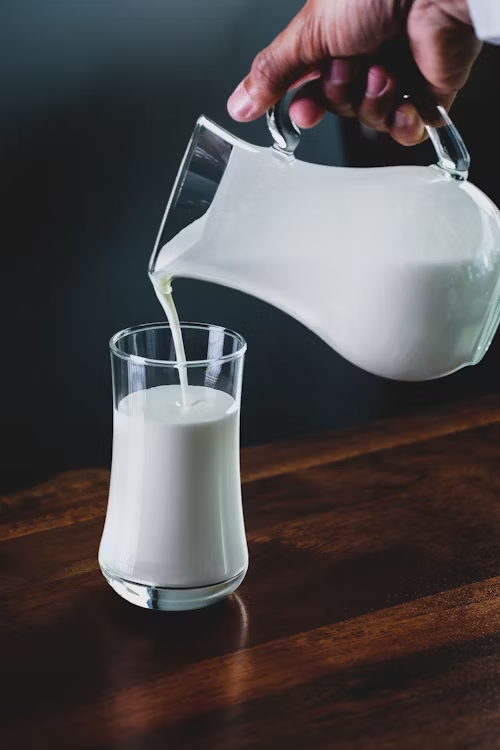In recent years, the demand for milk alternatives has surged, driven by a variety of factors, including dietary preferences, lactose intolerance, environmental concerns, and ethical considerations. Whether you’re vegan, lactose intolerant, or simply exploring new options, the market today offers a wide range of milk substitutes that can easily replace cow’s milk in most recipes and beverages. From plant-based options to more specialized formulas, these alternatives provide diverse flavors, textures, and nutritional profiles to suit different tastes and lifestyles.

1. Why Choose Milk Alternatives?
There are several reasons why people might turn to milk alternatives:
- Lactose Intolerance: Many individuals are unable to properly digest lactose, the natural sugar found in cow’s milk. For them, lactose-free milk alternatives offer a convenient solution without the discomfort of bloating, gas, or diarrhea.
- Vegan and Plant-Based Diets: For those following a vegan lifestyle or plant-based diet, animal products like milk are off the menu. Plant-based milks provide a cruelty-free alternative while still offering a creamy texture and versatility in cooking.
- Health Concerns: Some people prefer milk alternatives for health reasons. For example, they may choose lower-calorie options, or those that are fortified with additional nutrients like vitamins, minerals, and antioxidants.
- Environmental Impact: The environmental footprint of dairy farming—including water usage, land, and greenhouse gas emissions—has led many consumers to seek more sustainable alternatives. Plant-based milks, on average, have a lower carbon footprint and use fewer resources than cow’s milk.
2. Popular Milk Alternatives
With a growing demand for dairy-free options, a variety of milk substitutes have emerged, each with unique flavors, benefits, and uses.
1. Almond Milk
One of the most popular plant-based milks, almond milk is made by blending almonds with water and then straining the mixture to remove solids. It has a mild, slightly nutty flavor and is often used in smoothies, cereals, or coffee.
- Nutritional Profile: Almond milk is low in calories (especially the unsweetened variety) and is typically fortified with calcium and vitamin D. However, it contains minimal protein compared to cow’s milk.
- Best For: Coffee, baking, smoothies, and cereals.
2. Soy Milk
Soy milk, made from soybeans, has a creamier texture compared to many other plant-based milks, making it a great substitute for dairy in cooking and baking. It’s one of the few milk alternatives that naturally contain a comparable amount of protein to cow’s milk.
- Nutritional Profile: Soy milk is high in protein and often fortified with vitamins and minerals, including calcium and vitamin B12. It’s a great option for those seeking a nutrient-dense milk alternative.
- Best For: Coffee, savory dishes, smoothies, baking, and cereal.
3. Oat Milk
Oat milk has gained popularity in recent years due to its creamy texture and naturally sweet taste. Made from oats and water, it’s often blended with added flavorings and sweeteners.
- Nutritional Profile: Oat milk is rich in fiber and typically higher in carbohydrates than other milk alternatives, but it provides a smooth, mild taste. It is also often fortified with vitamins like B12, D, and calcium.
- Best For: Coffee (especially lattes), smoothies, cereals, and baking.
4. Coconut Milk
Coconut milk is made by blending the flesh of mature coconuts with water. This milk alternative has a distinct tropical flavor and a thicker consistency due to the high fat content.
- Nutritional Profile: While coconut milk is rich in fats, the majority of those are medium-chain triglycerides (MCTs), which may have health benefits. However, it is relatively low in protein and may be higher in calories than other plant-based milks.
- Best For: Cooking (particularly in curries or desserts), smoothies, and tropical beverages.
5. Rice Milk
Rice milk is made by blending rice with water and straining the mixture to create a thin, slightly sweet liquid. It is often used by those with multiple allergies, as it is naturally free from soy, nuts, and gluten.
- Nutritional Profile: Rice milk is typically low in protein and fat, and though it has a naturally sweet flavor, it can be higher in carbohydrates. It’s often fortified with nutrients like calcium, vitamin D, and vitamin B12.
- Best For: Baking, smoothies, and cereals.
6. Cashew Milk
Cashew milk is a creamy, rich alternative made from cashews and water. It has a mild, slightly nutty flavor and is a great addition to both sweet and savory recipes.
- Nutritional Profile: Cashew milk is rich in healthy fats but low in protein. Like other milk alternatives, it’s often fortified with calcium and vitamin D to enhance its nutritional value.
- Best For: Smoothies, coffee, baking, and savory dishes like sauces or soups.
7. Hemp Milk
Hemp milk is made by blending hemp seeds with water. It has a unique, earthy flavor and is a great choice for those seeking a dairy-free milk with added omega-3 fatty acids.
- Nutritional Profile: Hemp milk is high in essential fatty acids, including omega-3s, and offers a good balance of protein. It’s often fortified with vitamins and minerals like calcium, vitamin D, and B12.
- Best For: Smoothies, coffee, cereal, and baking.
8. Macadamia Milk
Macadamia milk is made from macadamia nuts and water, creating a smooth, slightly buttery flavor with a mild sweetness. It’s a relatively newer addition to the milk alternative market.
- Nutritional Profile: Macadamia milk is low in calories, rich in healthy fats, and offers a creamy texture similar to that of cow’s milk. It’s often fortified with vitamins and minerals.
- Best For: Coffee, smoothies, and baking.
3. Choosing the Right Milk Alternative
The best milk alternative for you depends on your individual needs, taste preferences, and how you intend to use it. Here are some tips to guide your choice:
- For protein: Soy milk and hemp milk are the best options, as they provide a protein content similar to cow’s milk.
- For creaminess: Oat milk, cashew milk, and coconut milk offer the richest, creamiest textures, making them ideal for coffee, smoothies, and baking.
- For sweetness: Rice milk and oat milk have a natural sweetness, which makes them excellent for sweet recipes or for those who prefer a milder flavor.
- For allergies: If you have allergies to nuts or soy, rice milk, oat milk, and hemp milk are great alternatives that are less likely to cause reactions.
4. Nutritional Considerations
While most milk alternatives are fortified with nutrients like calcium, vitamin D, and B12, it’s important to check the labels for added sugars, preservatives, or artificial flavorings, especially in flavored varieties. Unsweetened versions are often the best choice for those looking to control their sugar intake. Additionally, some plant-based milks are naturally low in protein compared to cow’s milk, so it’s important to ensure you’re meeting your protein needs from other sources.
5. Environmental and Ethical Benefits
Switching to milk alternatives can also have a positive impact on the environment. Dairy farming is resource-intensive, requiring large amounts of water, land, and energy. It also contributes significantly to greenhouse gas emissions. Plant-based milks generally have a lower environmental footprint, using fewer resources and producing fewer emissions.
For those who are concerned with animal welfare, choosing plant-based milk alternatives aligns with ethical considerations. Unlike dairy farming, plant-based milk production does not involve the exploitation or harm of animals.

Milk alternatives have evolved significantly in recent years, offering a wide range of flavors, textures, and nutritional profiles to cater to diverse dietary preferences and health needs. Whether you’re avoiding dairy due to lactose intolerance, following a vegan lifestyle, or simply seeking a more sustainable option, there’s a milk alternative out there for you. From almond and oat to soy and hemp, these milk substitutes are versatile, nutrient-rich, and ready to replace cow’s milk in almost any recipe. As consumers continue to prioritize health, sustainability, and ethical considerations, the popularity of milk alternatives is likely to keep growing, offering even more innovative options in the future.

